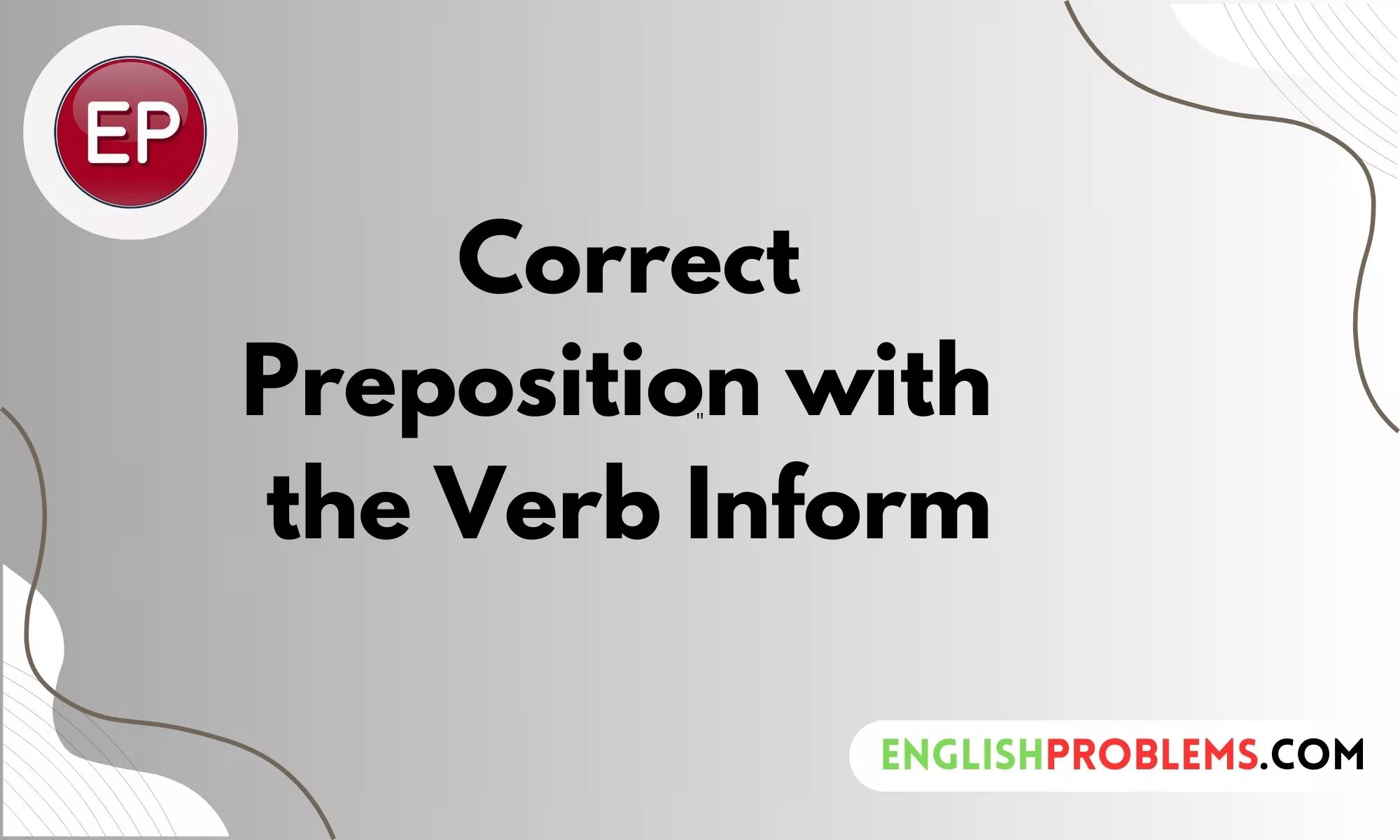Understanding how to use prepositions correctly with verbs is crucial for clear and accurate communication in English. The verb “inform” is particularly tricky because it can be followed by different prepositions, each altering the meaning slightly. Mastering the correct preposition with “inform” can enhance your writing and speaking, making your messages more precise.
In this guide, we’ll delve into the correct usage of “inform” with various prepositions, explore contextual differences, and offer practical tips to help you get it right.
Understanding the Verb “Inform”
The verb “inform” means to give someone information about something. It’s a formal word often used in professional and academic contexts. For instance:
- “She informed the team about the changes in the schedule.”
- “The manager will inform the staff of the new policy.”
Using “inform” correctly involves choosing the right preposition to convey the intended meaning. Here’s a closer look at how different prepositions modify the meaning of “inform.”
Common Prepositions with “Inform”
Inform of
“Inform of” is used to indicate the information being communicated to someone. This preposition is often used when referring to specific details or updates.
Usage:
- “The secretary informed me of the meeting’s location.”
- “He was informed of the new regulations.”
Common Mistakes:
- Using “about” instead of “of”: For example, saying “She informed me about the meeting” is less precise than “She informed me of the meeting.”
- Redundancy: Avoid saying “informed of the details of” as it can be simplified to “informed of the details.”
Inform about
“Inform about” is used when you want to provide information regarding a broader topic or subject. It is suitable for general updates or announcements.
Usage:
- “The company will inform the employees about the upcoming event.”
- “She informed him about the changes in the schedule.”
Common Mistakes:
- Confusing with “of”: Using “inform of” instead of “inform about” can make the sentence less clear when discussing general topics.
- Inappropriate for specifics: Avoid using “inform about” when discussing specific details that would be better suited to “inform of.”
Inform on
“Inform on” is less common but used in contexts where someone provides information or updates about a particular issue or topic. It can also imply reporting on someone’s actions.
Usage:
- “The report will inform on the project’s progress.”
- “He was asked to inform on the policy changes.”
Common Mistakes:
- Misuse in formal contexts: Using “inform on” in formal writing might sound awkward; it’s better suited for informal or specific contexts.
- Ambiguity: Ensure that the context clarifies what is being informed about, as “inform on” can be vague.
Contextual Usage
Formal vs. Informal Settings
The choice of preposition can depend on whether you are in a formal or informal setting.
- Formal Settings: Use “inform of” or “inform about” for precise, professional communication. For example, in business correspondence, you might say, “We are pleased to inform you of the new policy.”
- Informal Settings: “Inform about” might be used more frequently in casual conversation. For instance, “I wanted to inform you about the change in plans.”
Regional Variations
Prepositional usage can vary by region or dialect, which affects how “inform” is used:
- American English: Typically prefers “inform of” and “inform about” depending on the context. For example, “Please inform me of any updates.”
- British English: Might use “inform of” more frequently in formal contexts and “inform about” for broader topics. For instance, “The staff will be informed about the new procedure.”
Understanding these regional differences can help in tailoring communication to different audiences.
Practical Tips for Mastering Prepositions with “Inform”
Contextual Clues
When choosing the correct preposition, consider the context of the information being shared:
- Specific Details: Use “inform of” to provide precise information. For example, “He was informed of the specific changes.”
- General Information: Use “inform about” to give a broader overview. For example, “The company will inform about the upcoming events.”
Practice Exercises
Here are some practice sentences to test your understanding:
- “She informed the team ____ the new project deadlines.” (Correct answer: “of”)
- “He was informed ____ the changes in the policy.” (Correct answer: “about”)
- “The report will inform ____ the recent developments.” (Correct answer: “on”)
Resources for Further Learning
For continued learning and practice, consider these resources:
- Grammar Websites: Websites like Grammarly and Purdue OWL offer in-depth explanations and exercises.
- Books: “Practical English Usage” by Michael Swan provides comprehensive coverage of English grammar and usage.
- Online Courses: Platforms like Coursera and Udemy offer courses focused on English grammar and writing skills.
Summary and Key Takeaways
Mastering the correct preposition with the verb “inform” involves understanding how each preposition alters the meaning of the sentence. Here are the key points:
- “Inform of” is used for specific details.
- “Inform about” is suitable for general topics.
- “Inform on” can be used in specific contexts or informal settings.
By practicing and paying attention to context, you can avoid common mistakes and enhance your communication skills. Applying these guidelines will help you use “inform” accurately and effectively in both written and spoken English.
Conclusion
Using the correct preposition with the verb “inform” is essential for clear and effective communication. Whether you’re writing a formal report or having a casual conversation, choosing the right preposition ensures your message is conveyed accurately. Practice regularly and utilize the resources provided to master these nuances and improve your English skills.

Emily Johnson is a seasoned writer with a sharp eye for grammatical accuracy. Her detailed guides and helpful tips make her a trusted source for anyone looking to enhance their understanding of English grammar and elevate their writing.










